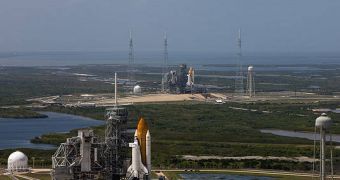NASA officials announced on Thursday that they planned to move the STS-125 mission launch date a day earlier, in order to be able to avoid conflicts that may occur with other spacecraft at the Kennedy Space Center, in Florida. If this new plan is approved next week, then Atlantis could lift off on May 11th, at 2:01 pm EDT (1801 GMT), as opposed to May 12th, as originally planned. The flight is the last servicing mission to the venerable Hubble Space Telescope, and will last for about 11 days. During this time, five spacewalks will be performed, as astronauts will repair and add new instruments to the orbit-based observatory.
In recent weeks, engineers at the agency have come to realize that the risk posed to the Atlantis shuttle by space debris is actually lower than they first thought, which means that the entire mission could be moved ahead of schedule. Already, the launch pad from which Atlantis is supposed to take off has been assigned to the ARES I test flight, and experts need at least a few months to make the necessary modifications to the installation. So, each day that they win weighs considerably in the success or failure of the new delivery system.
“I feel fairly confident that we can make a May 11th launch date,” LeRoy Cain, who is the shuttle program deputy manager at NASA, said in a series of press briefings. “Everything really needs to go our way in terms of completing our installations and hookups. Really, our primarily goal is to get it right, to make sure we don't mess anything up,” NASA's Hubble Project Manager Preston Burch added. Cain also argued that moving the launch sequence a day earlier would also mean that the shuttle would get two more shots at a lift off, in case something malfunctioned the first time.
After May 11th through 13th, the shuttle will remain grounded, as a military exercise will take place at the adjacent Cape Canaveral Air Force Base. This means that the skies will not be clear, and that the activity at the spaceport will be hindered. But it's not airplanes that pose the biggest threat to Atlantis' security. Space debris collision risks have been originally calculated to be at around 1-in-185, a value that is higher than NASA's 1-in-200 maximum. However, recent calculations have shown that the risk may actually be significantly lower, of about 1-in-221.
For the new STS-125 mission, the seven-astronaut crew will have to fly Atlantis in a different, higher orbit than the International Space Station (ISS) occupies, which means that it won't be able to dock on the facility if something is to go wrong with the craft. Fortunately, the Endeavor shuttle is standing by at the KSC and is prepared to take off in the event of an accident. NASA has thought the STS-400 contingency mission very carefully, but is hoping it will never come to launching it, Space reports.

 14 DAY TRIAL //
14 DAY TRIAL //